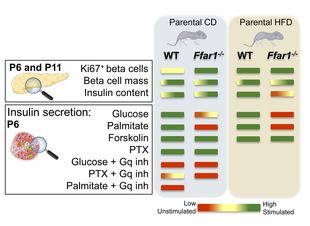The ability of the pancreatic beta cells to release adequate amounts of insulin to combat increased glucose levels still needs to develop in newborn mice. DZD researchers have discovered that free fatty acid receptor 1 (FFA1) is essential in enabling the progeny to adapt to metabolic challenges, for example, the mother’s high-fat diet. In the future, therapies that target FFA1 may help better protect offspring from the consequences of maternal obesity.
The pancreatic beta cells in newborn mice must undergo various maturation processes before releasing insulin after exposure to glucose. This functional maturation of the beta cells occurs gradually during the early postnatal phase. Environmental factors, such as the mother’s metabolism and breastmilk feeding, play an essential role in the later functionality of the beta cells in the offspring.
FFA1 Enables Adaptation to Metabolic Challenges
Researchers at the DZD partner Institute for Diabetes Research and Metabolic Diseases (IDM) of Helmholtz Munich at the University Hospital Tuebingen investigated the role of free fatty acid receptor 1 (FFA1) in beta cell maturation. The researchers fed wild-type mice possessing intact FFA1 and other animals with an FFA1 knockout mutation either with a high-fat diet or standard diet in the eight weeks before mating and during the gestation and lactation periods.
A High-Fat Diet Causes Increased Blood Sugar Levels in Offspring
At six days old, young mice whose parents possessed the FFA1 knockout mutation and who were given standard feed showed higher blood sugar levels than the offspring of wild-type mice that had also received a regular diet. In contrast, if the parents received a high-fat diet, the wild-type offspring displayed elevated blood sugar levels on day six.
Furthermore, the insulin response of the FFA1 knockout offspring was impaired. Compared to the offspring of the FFA1 knockout mice, the beta cell insulin secretion resulting from increased glucose levels was stimulated four to five times more in the wild-type mice.
A New Target for Protection from Maternal Obesity
The researchers concluded that FFA1 is essential for the development of an adequate insulin response in young mice, enabling them to adjust their insulin secretion to metabolic challenges, such as the high-fat diet of the parents.
In the future, it may be possible to pharmacologically modulate the FFA1 pathways to mitigate the effects of maternal obesity and/or gestational diabetes in the offspring.

© Felicia Gerst (images from bioicons.com)
Original publication:
Lorza‑Gil E, …, Gerst F. Glucose‑stimulated insulin secretion depends on FFA1 and Gq in neonatal mouse islets. Diabetologia, 2023. DOI: 10.1007/s00125-023-05932-5

